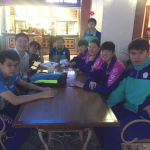This user has no status.
This user has no status.
Active Member
Hey, it's me again ^^
I suppose some of you already coached other people. How do you coach your player? I know there are a lot differences between each coach and so I liked to hear how it's here
And also if you coached boys and girls, who is easier to coach or who will do or try to do what the coach said? ^^
Personnaly I first coached some of my colleagues (boys), but none of them seem to be interested in what I was saying, they kept playing as before.
I had enough of that and went to the girls team because they searched a coach (like the boys did). And there, they listen to you and try to perform that in the game. The consequence of that was that the girl team managed to win the team event in an international youth cup near Luxembourg.
What I do when I coach is that while visualising the game, I search the weakpoints of the opponent and the weakpoints of my player.
Then, between the sets, I tell them that and also suggest some things. I also try to keep them focused and to not lose track!
If the player is demotivated, I try to consolate her or him and try to bring back the motivation (This works good for girls but rarely for boys).
Now, it's your turn
I suppose some of you already coached other people. How do you coach your player? I know there are a lot differences between each coach and so I liked to hear how it's here
And also if you coached boys and girls, who is easier to coach or who will do or try to do what the coach said? ^^
Personnaly I first coached some of my colleagues (boys), but none of them seem to be interested in what I was saying, they kept playing as before.
I had enough of that and went to the girls team because they searched a coach (like the boys did). And there, they listen to you and try to perform that in the game. The consequence of that was that the girl team managed to win the team event in an international youth cup near Luxembourg.
What I do when I coach is that while visualising the game, I search the weakpoints of the opponent and the weakpoints of my player.
Then, between the sets, I tell them that and also suggest some things. I also try to keep them focused and to not lose track!
If the player is demotivated, I try to consolate her or him and try to bring back the motivation (This works good for girls but rarely for boys).
Now, it's your turn










